Benefit and limitation of using blockchain in smart cities to improve citizen services
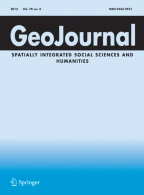
This paper examines the potential of blockchain technology to create more efficient, secure, and transparent smart cities. The paper covers the six main components of smart cities and how blockchain can address challenges and provide benefits in areas such as governance, transportation, environment, economy, living, and citizen. It includes use cases, technical requirements and potential limitations of blockchain implementation in smart cities. Additionally, the paper explores the current state of smart cities and their challenges and how blockchain can address them. Furthermore, it delves into the future impact of blockchain on urban life, including improved governance, business models, citizen engagement, transportation, security, sustainable development and real-estate. The paper highlights the potential benefits of blockchain in smart cities but also emphasizes the need to approach its implementation with caution, considering limitations and engaging all stakeholders to create smart cities that better serve citizens.
This is a preview of subscription content, log in via an institution to check access.
Access this article
Subscribe and save
Springer+ Basic
€32.70 /Month
- Get 10 units per month
- Download Article/Chapter or eBook
- 1 Unit = 1 Article or 1 Chapter
- Cancel anytime
Buy Now
Price includes VAT (France)
Instant access to the full article PDF.
Rent this article via DeepDyve
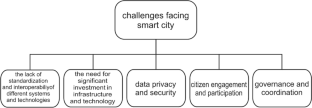
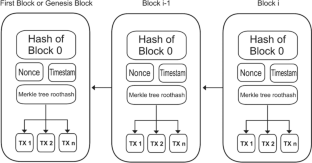
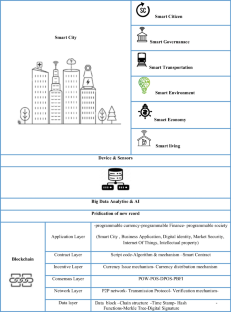
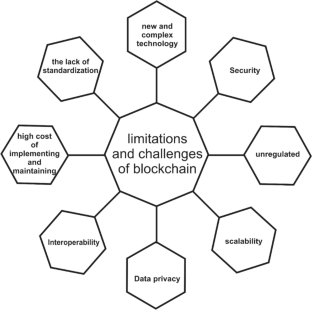
Similar content being viewed by others

Blockchain for Smart City: Opportunities and Future Research Directions
Chapter © 2022

Blockchain Systems for Smart Cities and Regions: An Illustration of Self-Sovereign Data Governance
Chapter © 2022
Blockchain-based sharing services: What blockchain technology can contribute to smart cities
Article Open access 13 December 2016
Explore related subjects
Abbreviations
The Internet of Things (IoT) describes the network of physical objects—“things”—that are embedded with sensors, software, and other technologies for the purpose of connecting and exchanging data with other devices and systems over the internet
Artificial intelligence (AI) is firstly an academic discipline with various, often conflicting, views on what constitutes its area of research, as well as goals and approaches used, including logical, knowledge-based approach
References
- Ahmad, R. W., Salah, K., Jayaraman, R., Yaqoob, I., & Omar, M. (2021). Blockchain for waste management in smart cities: A survey. IEEE Access.
- Akhtar, T. (2023). Blockchain technology: the beginning of a new era in reforming, corporate governance mechanisms. Journal of the Knowledge Economy. https://doi.org/10.1007/s13132-023-01289-7
- Al Mahfuj Shaan, A., Nausheen, T., & Haque, A. B. (2022). Blockchain for smart city: Opportunities and future research directions”, ICDTA 2022: Digital Technologies and Applications pp 267–275.
- Alam, T. (2022). Blockchain cities: the futuristic cities driven by Blockchain, big data and internet of things”. GeoJournal,87, 5383–5412. ArticleGoogle Scholar
- Alnahari, M. S., & Ariaratnam, S. T. (2022). The application of blockchain technology to smart city infrastructure. Smart Cities,5(3), 979–992. https://doi.org/10.3390/smartcities5030049ArticleGoogle Scholar
- Attaran, H., Kheibari, N., & Bahrepour, D. (2022). Toward integrated smart city: a new model for implementation and design challenges. GeoJournal,87(Suppl 4), S511–S526. ArticleGoogle Scholar
- Awan, K. A., Din, I. U., & Almogren, A. (2022). A blockchain-assisted trusted clustering mechanism for IoT-enabled smart transportation system”. Sustainability,14(22), 14889. https://doi.org/10.3390/su142214889ArticleGoogle Scholar
- Bagga, P., & Das, A. K. (2022) Blockchain for smart transport applications”, Advances in Blockchain Technology for Cyber Physical Systems, 125–154.
- Bagloee, S. A., Heshmati, M., Dia, H., Ghaderi, H., Pettite, C., & Asadif, M. (2021). Blockchain: The operating system of smart cities. Cities,112, 103104. ArticleGoogle Scholar
- Balan, A., Alboaie, S., Kourtit, K., & Nijkamp, P. (2022). Blockchain systems for smart cities and regions: An illustration of self-sovereign data governance. In Knowledge Management for Regional Policymaking, (pp. 163-190). https://doi.org/10.1007/978-3-031-15648-9_9
- Bhushan, B., Khamparia, A., Sagayam, K. M., Sharma, S. K., Ahad, M. A., & Debnath, N. C. (2020). Blockchain for smart cities: A review of architectures, integration trends and future research directions. Sustainable Cities and Society,61, 102360. ArticleGoogle Scholar
- Biswas, S., Yao, Z., Yan, L., Alqhatani, A., Bairagi, A. K., & Masud, F. A. M. (2023). Interoperability benefits and challenges in smart city services: Blockchain as a solution. Electronics,12, 1036. ArticleGoogle Scholar
- Ebrahim, M., & Hafid, A. (2022) Blockchain as privacy and security solution for smart environments: A survey. arXiv:2203.08901v1
- El Bekkali, A., Essaaidi, M., (Senior Member, IEEE), & Boulmalf, M. (2023). A blockchain-based architecture and framework for cybersecure smart cities”. IEEE Access,11, 76359–76370. https://doi.org/10.1109/ACCESS.2023.3296482ArticleGoogle Scholar
- Espositoa, C., Ficco, M., & Gupta, B. B. (2021). Blockchain-based authentication and authorization for smart city applications. Information Processing & Management,58(2), 102468. ArticleGoogle Scholar
- Fadi, O., Karim, Z., Abdellatif, E. G., & Mohammed, B. (2022). A survey on blockchain and artificial intelligence technologies for enhancing security and privacy in smart environments. IEEE Access,10(99), 93168–93186. https://doi.org/10.1109/ACCESS.2022.3203568ArticleGoogle Scholar
- Farimani, H. F., Bahrepour, D., & Tabbakh, S. R. K. (2020). Agreement violation and energy consumption using the FMT method. Journal of Information Systems and Telecommunication (JIST),4(28), 316. Google Scholar
- Florea, A. I., & Anghel, I. (2022). A review of blockchain technology applications in ambient assisted living. Future Internet,4, 150. https://doi.org/10.3390/fi14050150ArticleGoogle Scholar
- Hakak, S., Khan, W. Z., Gilkar, G. A., Imran, M., & Guizani, N. (2020). Securing smart cities through blockchain technology: Architecture, requirements, and challenges. Journals & Magazines IEEE Network,34(1), 8. ArticleGoogle Scholar
- Hasan, M. K., Akhtaruzzaman, M., Kabir, S. R., & Gadekallu, T. R. (2022). Evolution of industry and blockchain era: Monitoring price hike and corruption using BIoT for smart government and industry 4.0”. Journal IEEE Transactions on Industrial Informatics, 18(12).
- Jiang, S., & Ræder, T. B. (2022) Experience on Using ArchiMate Models for Modelling Blockchain-Enhanced Value Chains. In Proceedings of the 26th international conference on evaluation and assessment in software engineering (EASE '22) (pp. 375–382). New York: Association for Computing Machinery. https://doi.org/10.1145/3530019.3531346
- Khawaja, S., & Javidroozi, V. (2023). Blockchaintechnology as an enabler for cross-sectoralsystemsintegration for developingsmart sustainable cities. IET SmartCities,5, 151–172. Google Scholar
- Li, D., Luo, Z., & Cao, Bo. (2022). Blockchain-based federated learning methodologies in smart environments. Cluster Computing,25, 2585–2599. https://doi.org/10.1007/s10586-021-03424-yArticleGoogle Scholar
- Liu, T., Sabrina, F., Jang-Jaccard, J., Xu, W., & Wei, Y. (2022). Artificial intelligence-enabled DDoS detection for blockchain-based smart transport systems. Sensors,22(1), 32. https://doi.org/10.3390/s22010032ArticleGoogle Scholar
- Loss, S., Singh, H. P., Cacho, N., & Lopes, F. (2022) Using FIWARE and blockchain in smart cities solutions. https://doi.org/10.1007/s10586-022-03732-x
- Majeed, U., Khan, L. U., Yaqoob, I., Kazmi, S. A., Salah, K., & Hong, C. S. (2021). Blockchain for IoT-based smart cities: Recent advances, requirements, and future challenges. Journal of Network and Computer Applications,181, 103007. ArticleGoogle Scholar
- Mora, H., Mendoza-Tello, J. C., Varela-Guzmán, E. G., & Szymanski, J. (2021). Blockchain technologies to address smart city and society challenges. Computers in Human Behavior,122, 106854. ArticleGoogle Scholar
- Nam, K., Dutt, C. S., Chathoth, P., & Khan, M. S. (2021). “Blockchain technology for smart city and smart tourism: latest trends and challenges”. Asia Pacific Journal of Tourism Research, 26(4). Smart Tourism Cities
- Nepal, J. P., Yuangyai, N., Gyawali, S., & Yuangyai, C. (2022). Blockchain-based smart renewable energy: Review of operational and transactional challenges. Energies,15(13), 4911. https://doi.org/10.3390/en15134911ArticleGoogle Scholar
- Parenti, C., Noori, N., & Janssen, M. (2022). A smart governance diffusion model for blockchain as an anti-corruption tool in smart cities”. Journal of Smart Cities and Society,1, 71–92. ArticleGoogle Scholar
- Pathak, N., Siddiqui, S. T., Singha, A. K., Mohamed, H. G., & Abhinandan, S. U. (2023). Smart quarantine environment privacy through iot gadgets using blockchain. Intelligent Automation & Soft Computing, 35(3), 3021–3036. https://doi.org/10.32604/iasc.2023.029053
- Pires, J., Shukla, V. K., Wanganoo, L., & Vyas, S. (2023). Challenges and opportunities in smart city network management through blockchain and cloud computing”, Evolving networking technologies: Developments and future directions, Chapter 7. https://doi.org/10.1002/9781119836667.ch7
- Rahman, M. S., Chamikara, M. A. P., Khalil, I., & Bouras, A. (2022). Blockchain-of-blockchains: An interoperable blockchain platform for ensuring IoT data integrity in smart city. Journal of Industrial Information Integration,30, 100408. ArticleGoogle Scholar
- Riđić, O., Jukić, T., Riđić, G., Mangafić, J., Bušatlić, S., Karamehić, J. (2022). Implementation of Blockchain Technologies in Smart Cities, Opportunities and Challenges. In Muthu, S. S. (Ed.), Blockchain technologies for sustainability. Environmental footprints and eco-design of products and processes. Singapore: Springer. https://doi.org/10.1007/978-981-16-6301-7_4
- Shari, N. F. M., & Malip, A. (2023). Blockchain-based decentralized data dissemination scheme in smart transportation. Journal of Systems Architecture,134, 102800. ArticleGoogle Scholar
- Singh, S., Sharma, P. K., Yoon, B., Shojafar, M., Cho, G. H., & Ra, I. H. (2020). Convergence of blockchain and artificial intelligence in IoT network for the sustainable smart city. Sustainable Cities and Society,63, 102364. ArticleGoogle Scholar
- Smart city index. (2023). IMD Smart City Index. https://www.imd.org/news/competitiveness/asian-and-european-citizens-see-their-cities-as-the-smartest-finds-2023-imd-smart-city-index/
- Treiblmaier, H., Rejeb, A., & Strebinger, A. (2020). Blockchain as a driver for smart city development: Application fields and a comprehensive research agenda. Smart Cities,3(3), 853–872. ArticleGoogle Scholar
- Uchani Gutierrez, O. C., & Xu, G. (2023). Blockchain and smart contracts to secure property transactions in smart cities. Applied Sciences,13(1), 66. ArticleGoogle Scholar
- Ullah, Z., Naeem, M., Coronato, A., Ribino, P., & De Pietro, G. (2023). Blockchain applications in sustainable smart cities. Sustainable Cities and Society,97, 104697. ArticleGoogle Scholar
- Valchanov, H., & Aleksieva, V. (2022). Blockchain and IoT integration for smart transportation”. Journal of Physics: Conference Series,2339, 012012. Google Scholar
- Wazid, M., Bera, B., Das, A. K., Mohanty, S. P., & Jo, M. (2022). Fortifying smart transportation security through public blockchain. IEEE Internet of Things Journal,9(17), 16532. ArticleGoogle Scholar
- Xia, L., Semirumi, D. T., & Rezaei, R. (2023). A thorough examination of smart city applications: Exploring challenges and solutions throughout the life cycle with emphasis on safeguarding citizen privacy. Sustainable Cities and Society,98, 104771. ArticleGoogle Scholar
Acknowledgements
Acknowledgements The authors are thankful to anonymous reviewers for their valuable comments and suggestions that helped improving the quality of the paper.





